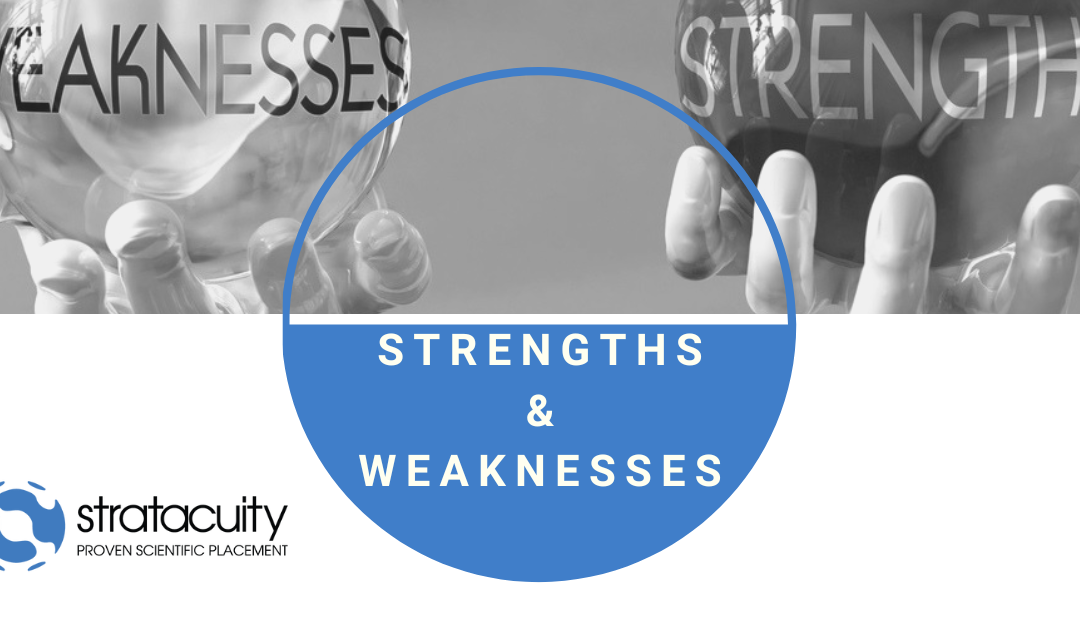Your Strengths and Weaknesses
When hiring managers ask about your strengths and weaknesses, aka improvement opportunities, they want to know if you can perform well on the job. Will you be a great addition to their team? Think, what traits do I poses that will set me apart from other candidates. How do my strengths relate to the position?
Hiring managers also want to see how you handle touchy topics, as they call them your weaknesses. Are you prepared to be diplomatic and well poised in your response, an optimist or a pessimist? I vote for optimist, because the pessimist is at home with Debbie, right! If you’re still seeing the glass half-empty, stop and reset your way of thinking!
Instead of thinking about them as weakness, see them as improvement opportunities to take on as your career evolves. It’s ok, everyone has a list of improvement opportunities and if you’re doing anything to improve yourself, your strengths will grow as your career advances. On the flip side, advancing usually means new challenges to overcome, but if you set the bar higher, you’re achieve more and grow.
Make it a Priority and Seek 360 Feedback
Have you taken the time to jot down your strengths and improvement opportunities? Right, with today’s boom and era of digital innovations, we worker bees are trying to live, love, laugh, all while drinking from the fire hose. Our day to day can be more like that of a rat race rather than a honey factory. So, yes, I get it and relatedly, most of us are busy trying to make the work-life balance happen. However, saying “I don’t have time” is just another way of saying you’re not going to do it, because you’re not making it a priority. If you’re serious about landing your next job, you’ll want to make this a priority.
If you haven’t been proactive about getting feedback throughout your career, start! Get 360 feedback from management, colleagues, clients, people you manage, etc. Real time feedback is valuable, so prioritize time to reach out and learn others’ take on your strengths and improvement opportunities. Who knows, maybe you’ll gather insight that will make you want to stay with your current employer. Suddenly, you’re feeling more confident knowing how much value others see in you or depend on you for. Shared value can make a significant impact! Positive feedback can be the reinforcement needed to motivate an employee and sustain retention. Is there a chance you’re making it a bigger weakness that what it really is? Can this be overcome with on the job training that you didn’t realize was available, until you set out to for feedback? Well, good-bye weakness and hello doable improvement opportunity! I can keep on about real time feedback, but we’ll save that for another blog.
Expect to Discuss Your Skills Related to the Position
Take off your modest mouse mask and communicate what you bring to the table. Pick a trait that illustrates your capabilities from your previous experience and discuss relevant skills and project examples that relate to the position. If any of your 360 feedback provided supporting examples, use them. Enforce your strengths with pertinent work examples that coincide. Give the hiring manager details and explain how they are relevant, what can you accomplish for this position with your experience and skill sets.
You’ve reset your way of thinking about weaknesses and now recognize them as improvement opportunities, so present them as such. It’s understandably an uncomfortable topic to discuss, but if you avoid the question or flat out say that you don’t have any weaknesses (improvement opportunities), red flags will be raised. You may as well raise your white flag! Instead, think of a non-essential skill, not something that’s going to hinder your ability to perform the job. Emphasize positivity and your improvement. Think about your added potential and contributions.
Combining Your Message and Emphasize the Positive
So, you’ve combined the strength of your skills related to the position and have a supporting example. You’ve reset your way of thinking and you’re ready to emphasize that non-essential opportunity for improvement. However, how are you improving? Are you taking a course, active in a forum, reading articles, books, or guides? Let’s take a look the following example to help tie it all together.
“As a technical analyst, I have developed excellent verbal and written communication skills. In addition to being able to communicate with a technical audience, I am able to communicate technical lingo in a manner that resonates with a non-technical audience. I’ve used my communication skills to assist my former employers’ business development team with understanding technical lingo and reporting. I also translated technical content for a non-technical audience. The content built was used in proposals that resulted in contract awards and new client accounts.
“Although I am well versed with communicating with mid-level and lower level management, I’m expanding myself and focusing on improving my public speaking skills and presenting my message geared towards an executive level audience. I’ve completed some public speaking workshops and am part of a local public speaking forum.”
You see! It doesn’t sound like a weakness when presented as growing ones experience and improving ourselves. What are you waiting for? Reset your way of thinking, prioritize real time feedback, remove your Modest Mouse mask, and start preparing!
Source: Apex Systems

